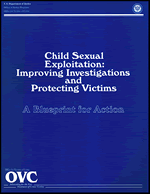January 1995
 This document
was designed to serve as a national prototype guiding collaboration among federal,
state, and local agencies that are involved in investigating and prosecuting child
pornography or prostitution cases and providing services to the young victims
of these crimes.
This document
was designed to serve as a national prototype guiding collaboration among federal,
state, and local agencies that are involved in investigating and prosecuting child
pornography or prostitution cases and providing services to the young victims
of these crimes.
In preparing these guidelines, we recognize that many criminal justice agencies have a wealth of experience working with child sexual abuse cases and young victims. Some of these agencies already have detailed protocols for the investigation process, including referrals to a child protection agency or children's advocacy center. Many communities have multidisciplinary teams which share information and streamline the investigative process to minimize its impact on young victims. We presume that all of this experience and expertise will be tapped in child sexual exploitation cases.
However, child sexual exploitation cases raise unique issues that are not anticipated in existing child sexual abuse protocols. These cases tend to feature the additional complexities of concurrent federal and state jurisdiction, and many (especially cases of child prostitution) involve a particularly challenging group of victims. Furthermore, child pornography and prostitution cases are rare in the caseloads of most criminal justice agencies. At the same time, there are many types of cases that fall into this broad category, and no two cases will raise the same issues for investigation, prosecution, or victim services. As a result, when a child sexual exploitation case is identified, the responsible professionals may have little relevant experience to guide them at critical decision points. The guidelines were written for a broad audience of federal, state, and local criminal justice personnel, including victim assistance providers, both public and private. They focus on issues that apply to all child sexual exploitation cases: role clarification, notification of relevant agencies, and referrals for victims. The guidelines do not include recommendations for specific professional practices, such as victim interviews, investigative techniques, evidentiary concerns, or intelligence gathering. However, the last section of this document contains a list of resources for training and technical assistance specific to these topics.
This E-only document is available online only. View ASCII file.